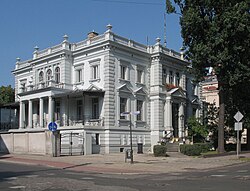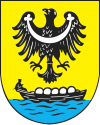Neusalz an der Oder
| Nowa Sól | |||
|---|---|---|---|

Museum
|
|||
|
|||
| Coordinates: 51°48′N 15°43′E / 51.800°N 15.717°E | |||
| Country |
|
||
| Voivodeship | Lubusz | ||
| County | Nowa Sól County | ||
| Gmina | Nowa Sól (urban gmina) | ||
| Government | |||
| • Mayor | Wadim Tyszkiewicz | ||
| Area | |||
| • Total | 21.56 km2 (8.32 sq mi) | ||
| Population (2006) | |||
| • Total | 40,351 | ||
| • Density | 1,900/km2 (4,800/sq mi) | ||
| Time zone | CET (UTC+1) | ||
| • Summer (DST) | CEST (UTC+2) | ||
| Postal code | 67-100 to 67-103 | ||
| Car plates | FNW | ||
| Website | http://www.nowasol.pl | ||
Nowa Sól [ˈnɔva ˈsul] (German: Neusalz an der Oder) is a town on the Oder River in Lubusz Voivodeship, western Poland. It is the capital of Nowa Sól County and had a population of 40,351 as of 2006[update].
The first settlement in the region of modern Nowa Sól dates to the 14th century, when the territory was under Bohemian sovereignty. In order to break Silesia's dependency on salt from Poland, Emperor Ferdinand I founded the demesne land Zum Neuen Saltze in 1563. The sea salt, originally from La Rochelle and the Iberian coast, was transported from Hamburg and Stettin (Szczecin) along the navigable Oder. A flood in 1573 led to the relocation of the salt refinery to the nearby village of Modritz (Modrzyca); the office of the administrator is now the town hall. The settlement was documented as Neusalzburg ("New Salzburg") in 1585 and later as Neusalz ("New Salt"). A trading harbor was built on the Oder in 1592. The Protestant Church of St. Michael, built from 1591–97, was converted to Roman Catholicism in 1654.
The entrance of Dutch and English merchants in the Baltic Sea at the end of the 16th century led to difficulties in the supply of unrefined salt. The unprofitable enterprise was also hampered by tolls on the Oder imposed by the Margraviate of Brandenburg. Salt refining in Neusalz nearly collapsed during the Thirty Years' War (1618–48), while recovery was hampered by the salt trade of Brandenburg and Poland afterwards. As the rulers of Swedish Pomerania, Sweden prevented salt from reaching the town from Stettin in 1710. Three years later Neusalz became an outpost for salt from Magdeburg and Halle.
...
Wikipedia



